On Monday, June 10, 2013, the Arab Center for Research and Policy Studies announced the main findings of the 2012/2013 Arab Opinion Index. Conducted annually by the ACRPS, the Arab Opinion Index aims to offer information on Arab public opinion with respect to economic, social and political issues, including attitudes towards democracy as well as civic and political participation. This year’s survey was conducted by the Center in coordination with its local partner institutions in 14 Arab countries during the period from July, 2012 to March, 2013: Yemen, Saudi Arabia, Iraq, Jordan, Palestine, Lebanon, Egypt, Sudan, Tunisia, Algeria, Morocco, and Mauritania; Kuwait and Libya were this year’s new entrants to the survey.
In total, 20,350 respondents took part in the survey through face-to-face interviews. Respondents were selected through a randomized, multi-staged, self-weighted clustered sampling process (“PPS”). Reported margins of error ranged between 2% and 3%. The countries surveyed represent 89% of the total population of the Arab region, making the Arab Opinion Index the largest such survey of its kind. In the information given in the tables below, where no specific country is cited, the figure represents the aggregate across all countries. The figure quoted for aggregates is a weighted average across all of the samples.
Results from the 2012/2013 Arab Opinion Index indicate that the Arab public views the Arab revolutions/Arab Spring favorably: a majority of respondents (61%) described the Arab Spring as “a positive development”. Only 22% of respondents viewed the Arab Spring negatively. Generally, the latter based their views on the revolutions’ failure to achieve their aims, the sharp political polarization engendered by the revolutions, the harsh economic circumstances under which Arabs continue to live, and the wide-scale human suffering resulting from the revolutions. 3% of those surveyed voiced outright opposition to the Arab revolutions, providing the rationale that the Arab Spring is an American-Islamist conspiracy.
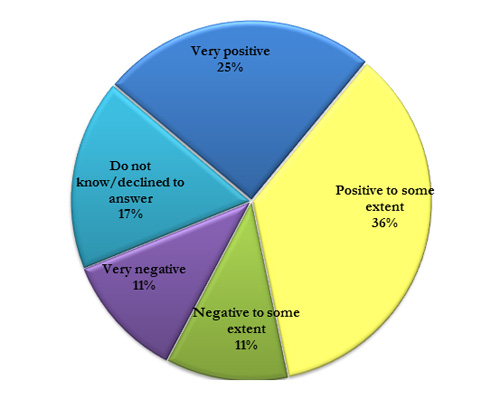 |
The Arab public is particularly supportive of the Syrian Revolution: 77% of our respondents supported the departure of Bashar al-Assad from power, while only 13% were opposed to his leaving office. Furthermore, 66% of respondents viewed a full change of regime as the best possible solution to the Syrian crisis. This contrasts with the 3% who voiced support for quashing the revolution. A further 10% of the Arab public propose a peaceful political process as the ideal way out of Syria’s crisis.
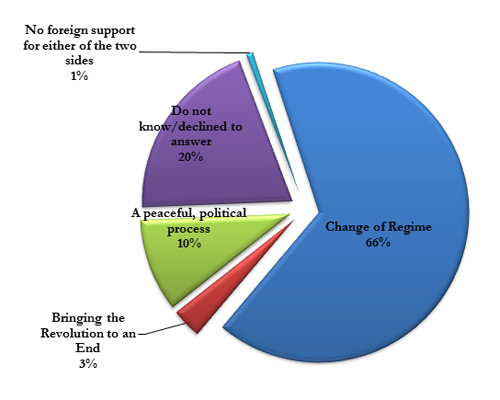 |
A majority of the Arab public believes that the revolutions either already have succeeded in achieving their aims, or will do so in the near (1-3 years) or medium-term future (4-7 years). These aims include securing human rights, guaranteeing public liberties including freedom of expression and of association, laying the foundations for democracy, combating corruption, and achieving social justice. Only 12% of respondents expressed a belief that the Arab revolutions would never realize these goals.
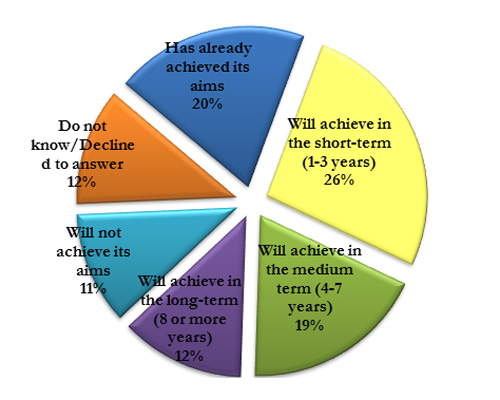 |
One half of the Arab public had “no concerns” with regards to the increase of Islamists’ political influence and their rise to power. On the other hand, 16% of respondents indicated that they had “serious concerns” with respect to the Islamists coming to power, and 20% responded that they had “some” concerns on this issue. In other words, over one third of the Arab public views Islamists with some level of trepidation.
Such concerns include the possibility that Islamist movements may not abide by the principle of peaceful transfers of power; that Islamists might use religion to impose restrictions on personal, cultural or creative freedoms; or that they may install themselves as the sole authorities responsible for the interpretation of religious doctrine, or favor those who are more religious.
Arab Public Opinion and Systems of Governance: Attitudes towards Democracy and Theocracy
A clear majority of respondents (68%) indicated their support for a democratic system of governance, while 18% of the Arab public voiced a negative attitude towards democracy.
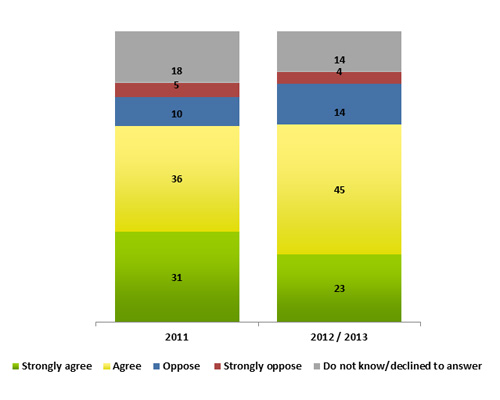 |
A majority of respondents believe that the guarantee of public and political freedoms – the freedom of association, peaceful transitions of power, and the separation of powers – are necessary to their countries. The majority of the Arab public thus views the democratic system as the political system most suitable for their countries. A total of 82% of respondents held the view that the democratic political system is appropriate for their home countries. When asked about the appropriateness of single party, authoritarian, Islamist or Sharia-based regimes in their country, between 50% and 62% of respondents in various Arab countries indicated that such systems were not appropriate.
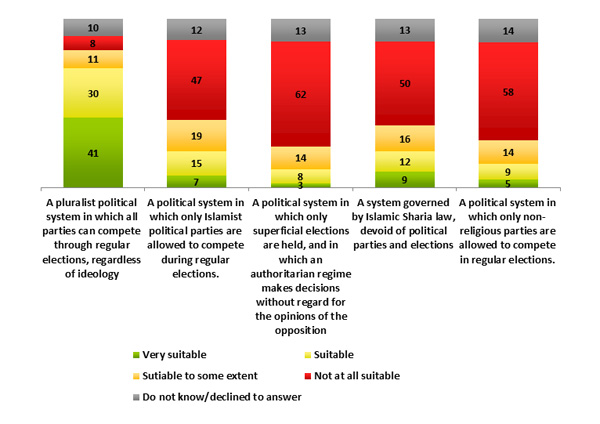 |
A Single Arab Nation?
In terms of broader Arab nationalism, 79% of the Arab public believes in the integrity of a single Arab nation, or that the various Arab peoples comprise one nation, notwithstanding the possible differences between Arab peoples. In contrast, only 14% of respondents held the view that the Arab peoples were in fact “distinct nations”. An overwhelming majority of 75% of respondents supported increased cooperation and integration between the various Arab states.
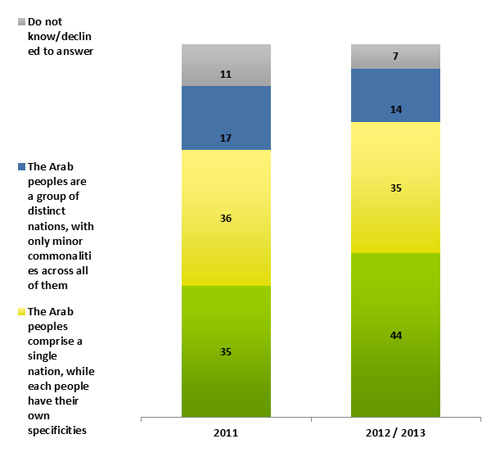 |
The overwhelming majority of the Arab opinion was able to name countries that constitute threats to the Arab national security,73% of respondents stated that Israel (52%) and the United States (21%) presented the largest threats to Arab national security. This compares with only 6% of respondents who believed that Iran was the single biggest threat to joint Arab security. A large majority of respondents (87%) were opposed to official recognition of Israel by their countries. In addition, 84% expressed opposition to the peace agreements which their countries or other Arab states have already signed with Israel.
When asked about which state posed the largest threat to the security of their specific home country, 36% of respondents held that this was Israel, while 11% believed it was the United States. Meanwhile, 12% of total respondents named Iran as the single biggest threat to their home country. This figure rises to over one third for respondents in Yemen, Iraq, Kuwait and Saudi Arabia.
Media, Internet Use and Social Media
Another point highlighted by the 2012/2013 Arab Opinion Index is that television remains the prime source of news for Arab citizens, with a 78% majority reporting that they relied on TV to stay informed and up-to-date with current affairs. This was followed by 8% who relied on radio, and 6% who relied on the internet as their main source of news. Daily newspapers were the least favored source of news for Arab citizens, with only 4% relying on the press for their news. Across all media networks, Al Jazeera has, for the second year running, maintained its lead as the most popular news source for the Arab public. It was followed by state broadcasters and then Al Arabiya.
The Arab Opinion Index also reported on internet use by the Arab public: 55% of respondents indicated that they have never used the internet, while 42% reported that they used it infrequently. Of those respondents who do use the internet, 62% had accounts on Facebook and 23% had accounts on the micro-blogging site Twitter. A clear majority of those who use these social media channels do so to take part in political affairs.
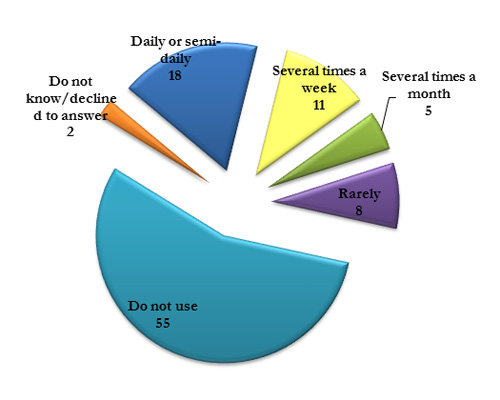 |
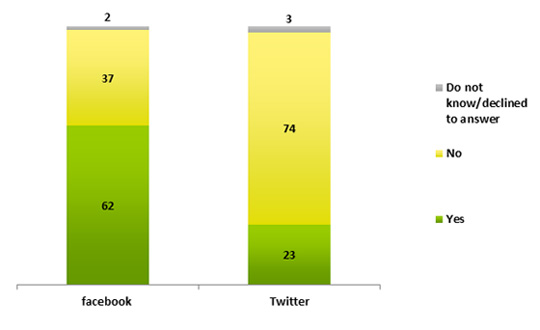 |
Religion, Religiosity and Public Life
A clear majority of the Arab public self-identifies as religious: 21% identify as “very religious” while 67% describe themselves as “religious to some extent”. In contrast, only 8% of respondents described themselves as “not religious”.
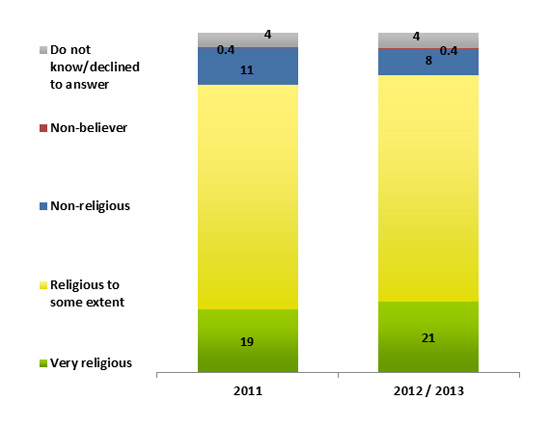 |
While a clear majority of the Arab public self-identifies as religious, most respondents to our survey also oppose any attempt to define adherents of varying interpretations of their own religion as “apostates,” and similarly oppose agitation against followers of different religions (Figure 10). Additionally, the results indicate that a majority of Arab citizens do not discriminate on the basis of religiosity in their daily interactions (Figure 11). In other words, a majority shows no preference for dealing with either similarly religious or similarly non-religious individuals in their daily lives.
Likewise, a majority of the Arab public is opposed to clerics having influence on public affairs or on the electorate’s voting choices. Respondents to our opinion poll also opposed the idea of the state using religion to win popular support, or electoral candidates using religion as a means of increasing their share of the vote. Meanwhile, our survey demonstrated that opinion on the statement that “It would be better if religion were separated from public life” (Figure 13) is more divided.
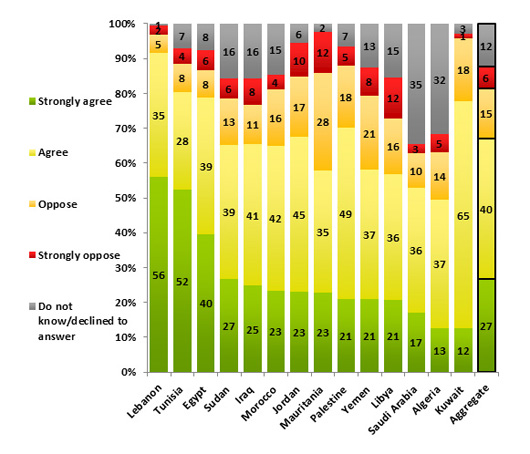 |
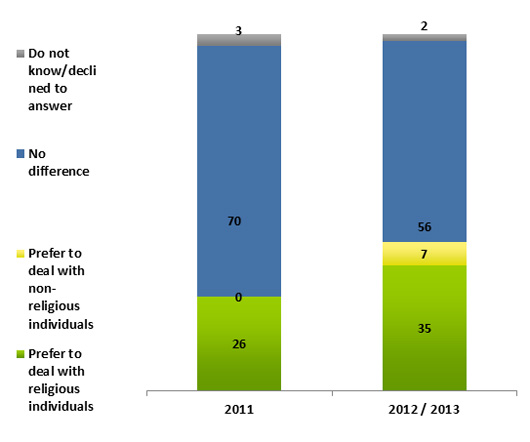 |
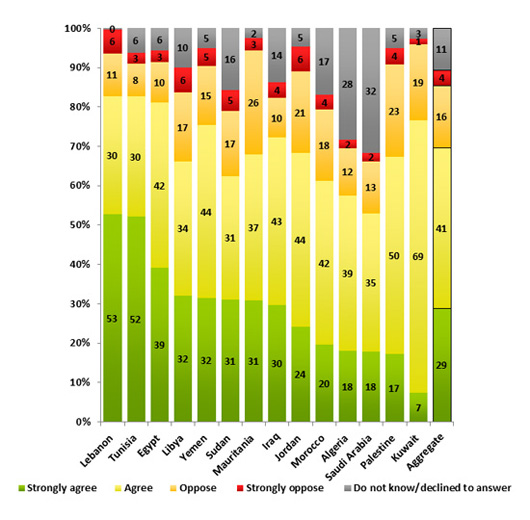 |
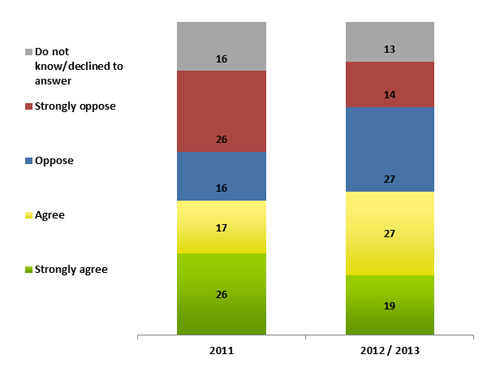 |
